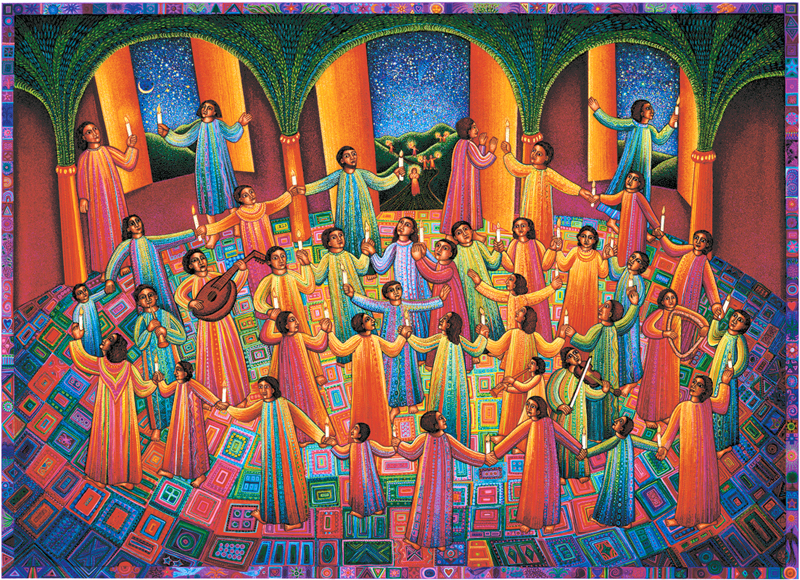2 Corinthians 12:2-10 New Revised Standard Version
2 I know a person in Christ who fourteen years ago was caught up to the third heaven—whether in the body or out of the body I do not know; God knows. 3 And I know that such a person—whether in the body or out of the body I do not know; God knows— 4 was caught up into Paradise and heard things that are not to be told, that no mortal is permitted to repeat. 5 On behalf of such a one I will boast, but on my own behalf I will not boast, except of my weaknesses. 6 But if I wish to boast, I will not be a fool, for I will be speaking the truth. But I refrain from it, so that no one may think better of me than what is seen in me or heard from me, 7 even considering the exceptional character of the revelations. Therefore, to keep me from being too elated, a thorn was given me in the flesh, a messenger of Satan to torment me, to keep me from being too elated. 8 Three times I appealed to the Lord about this, that it would leave me, 9 but he said to me, “My grace is sufficient for you, for power is made perfect in weakness.” So, I will boast all the more gladly of my weaknesses, so that the power of Christ may dwell in me. 10 Therefore I am content with weaknesses, insults, hardships, persecutions, and calamities for the sake of Christ; for whenever I am weak, then I am strong.
***************
Mystical experiences can be powerful, even life-changing, but it’s best not to boast about them. Thorns in the flesh on the other hand could be a reason to boast, though even this might be problematic. We see both kinds of experiences discussed in the reading for the Sixth Sunday after Pentecost. It is a word about boasting, mystical experiences, and thorns in the flesh, and in verse 1, which the lectionary omits, Paul acknowledges that he has to boast even if it’s not expedient to do so. However, the false apostles, who had come into the community and disrupted their lives with their boasts, need to be answered (2Cor. 11:12-13). Although Paul planted the church in Corinth, some of the people in the church had embraced these false apostles who had variously accused him of being weak, untrained in his speech, and more (2 Cor. 10:10; 11:6). The question is, about what should he boast? A mystical experience? A thorn in the flesh? The former might impress some in the congregation, but would the latter?
Now he could choose to boast about mystical experiences, which he speaks of here in 2 Corinthians 12. Though he suggests that the mystical experiences he will speak of belong to someone else. However, he is more than willing to boast in what he calls his thorn in the flesh. When it comes to the mystical experience, I’ve always wondered whether Paul was speaking of himself, but didn’t want to go there. Karl Barth makes the same assumption that it was Paul who had this mystical experience, but he writes that “this is the distinctive thing with the description of this ecstasy—he puts a space between himself and this man. And it is only at this remove that he will take part in the glory which this man—himself—has by virtue of these high things” [Barth, CD, 1:2, p. 332]. So, instead of owning up to being the one with the mystical experience, Paul chose to emphasize his thorn in the flesh. As to its nature, Paul doesn’t say, but it’s clear he had sought relief to no avail.
In this reflection, I want to look at both the mystical experience and the thorn in the flesh. The former is intriguing. What does Paul mean by a third heaven or paradise? At the same time, his thorn in the flesh is intriguing. One thing we know from this letter is that Paul feels the need to defend his ministry. Whatever the thorn was, it might be one of the reasons why the Corinthians have been dismissing his ministry. He looks weak and in Greco-Roman culture, weakness was not something to boast about. If he wanted to a successful religious leader then he needed to be a “manly man!”
We begin by exploring this mystical experience that a person had some fourteen years before. If this letter is written around 55 CE, then we’re talking somewhere around 40-41 CE, before a congregation had been planted in Corinth. Paul writes that he doesn’t know if this was an in-body or out-of-body experience, but whatever the case he knew of a man who was caught up into the “third heaven.” He then adds that the man was caught up into Paradise, thus equating the two. The message here parallels other apocalyptic claims to visions that were present in Jewish/rabbinic thought (see 1 Enoch). Whether Paul believed there were only three heavens or levels of heaven isn’t known as there is evidence of belief in more than three heavens. Whatever the case, Paul seems to believe that there are at least three levels, and following 2 Enoch 8, Paradise is the equivalent of the third heaven. There, the man heard words that could not be repeated. These were divine secrets that could not be shared with those on earth. While he might boast on behalf of the man who had the visions/mystical experience, he is only going to boast in his weaknesses.
He might not boast of mystical experiences, but he is willing to boast about his weaknesses. Again, that makes little sense in a Greco-Roman context. I sense that the false apostles have been sharing their grand visions as a way of proving their legitimacy. But, while he likely could do so (Damascus Road), he chooses not to go that route. He instead boasts in the fact that he had been given a thorn in the flesh that God had chosen not to deal with. As C.K. Barrett notes, “Paul does not wish too high an opinion of him to become current; it would obscure the fact that it is to his Gospel, and not himself that men should attend, and that he is a more effective witness to Christ crucified if he endures suffering and disgrace” [Barrett, Second Epistle to the Corinthians, p. 313]. Thus, Paul makes it clear that if he is to bear witness to the crucified Christ he can’t glory in mystical experiences, which, as we know from the first letter, the Corinthians valued.
So he turns to the thorn in the flesh, which he calls a “messenger of Satan.” Interestingly, he suggests that this thorn was sent upon him so that he might not become too elated by his visions, which leads to the suggestion that the above mystical experiences were his own. Now, this angel of Satan is actually sent by God, reminding us that in Paul’s mind, God is sovereign. Whatever happens, happens because God desires it. That doesn’t sit well with my theology that is rooted in an acknowledgment that God acts out of love and that God is not the author of suffering, but for a moment let’s simply let Paul talk. So, Barrett writes: “God allowed Paul astounding revelations of heavenly truth, which could not be communicated, but he did not intend that these should go to the apostles head” [Barrett, Second Epistle to the Corinthians, p. 314].
The question then concerns the nature of this thorn. It has often been assumed that it is a physical ailment of some type, such as blindness, but that is not a necessary conclusion. Barrett suggests that a speech impediment might be possible as it would have given a bad first impression (Gal. 4:13-15—though here Paul speaks of his eyes) [Barrett, p. 315]. Whatever it was Paul sought relief on three occasions but wasn’t granted it. The answer to this prayer was simply: “My grace is sufficient for you, for power is made perfect in weakness” (2 Cor. 12:9). Therefore, he has chosen to boast in this expression of weakness so that Christ’s power might be more evident in his life. So, he remains content with “weaknesses, insults, hardships, persecutions, and calamities for the sake of Christ, for whenever I am weak, then I am strong” (2 Cor. 12:10). Might these be what Paul had asked to be delivered from, but from which he was told that God’s grace is sufficient. Thus, having heard this, he was content to be buffeted by Satan if that served the purpose of the Gospel.
The passage presents us with a series of questions. In a culture that prizes success, does the message Paul presents resonate today? Might we be better off testifying to our conversations with God instead of being content with suffering? Having spent my ministry life as pastor of small churches, I have at times felt as if my ministries were considered less valuable than that of the big churches. What do you say at a clergy gathering when colleagues glory in large numbers of baptisms or stewardship drives that bring in huge sums? The message here seems to be simply, “my grace is sufficient.” That is not to say that those ministries lack value, but only that we should not measure the value of a ministry on human standards of success. Since this passage is designated for a Sunday near Independence Day (in 2021, July 4th falls on a Sunday), how might it be heard at this moment? It is easy to glory in the nation’s history, but right now that might not be wise. At the same time for some in our context, a word about being content with suffering might be inappropriate. At the end of the day, the question then concerns what is the nature of grace in our context? How might it create strength in us, even when we may feel weak? There is a time and a place for mystical experiences, but it is the grace of God that emerges even in our weakness that engenders true strength. May we entrust ourselves to the grace of God.



